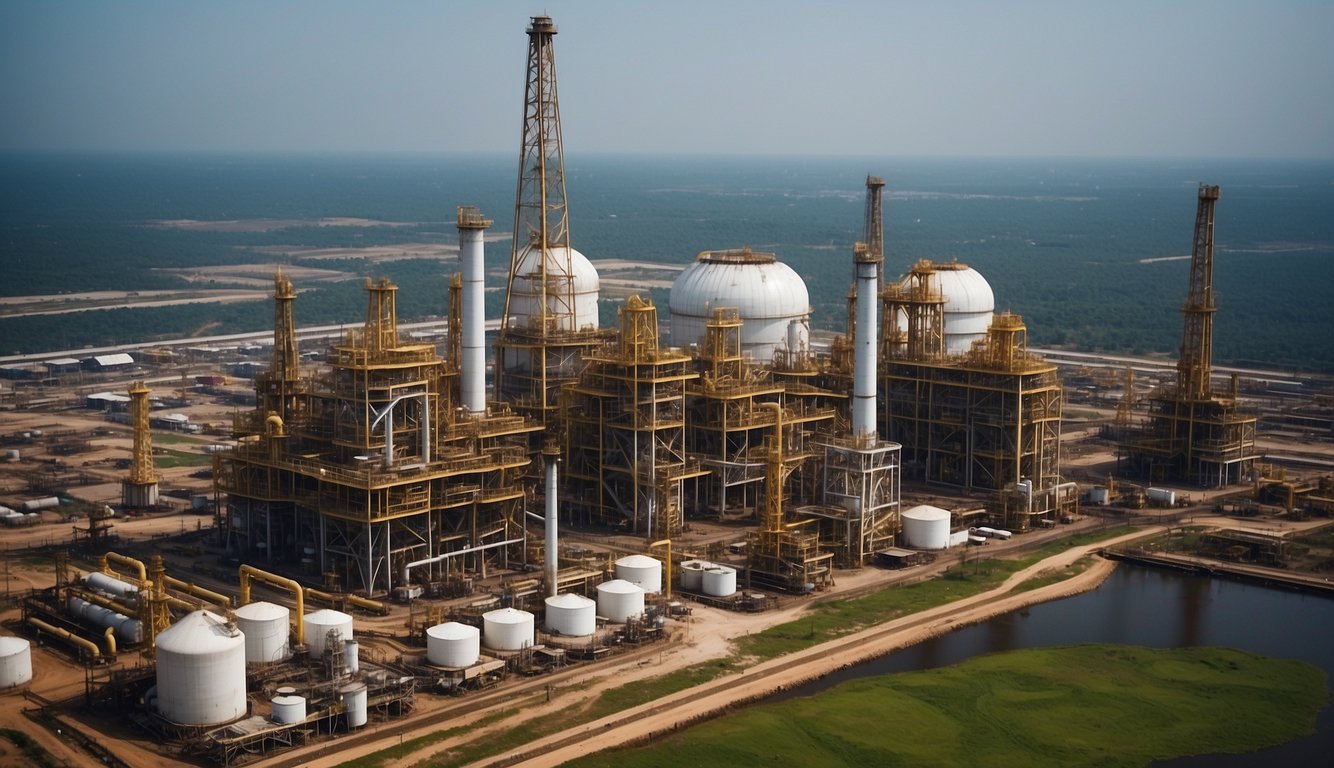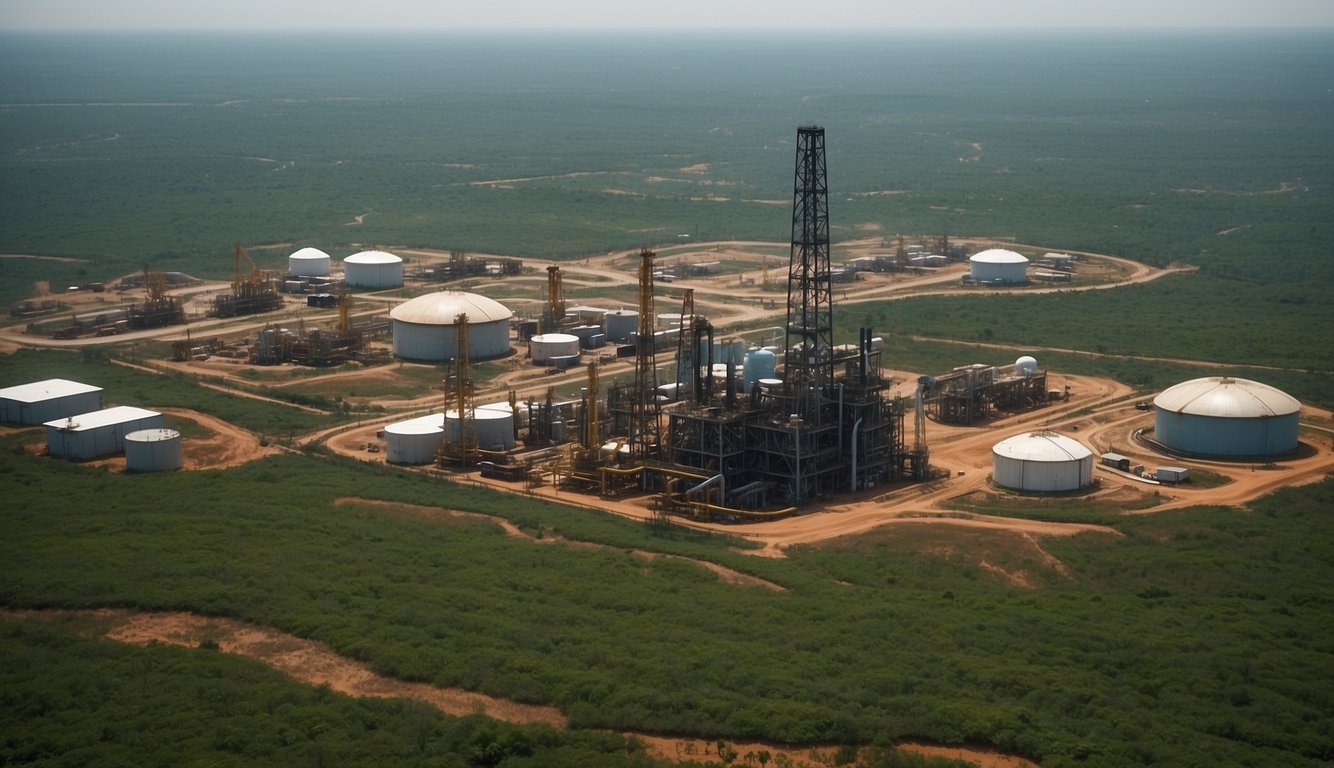If you’re interested in Nigeria’s oil and gas industry, you may be curious about the indigenous companies operating within the sector.
Nigerians own and operate these companies, and they play a significant role in the country’s economy. In this article, we’ll provide a list of indigenous oil and gas companies in Nigeria and some background information about each one.
Nigeria is one of the largest oil-producing countries in the world, and the industry accounts for a significant portion of the country’s gross domestic product (GDP).
While many multinational corporations have a presence in Nigeria’s oil and gas sector, a number of indigenous companies are making their mark. These companies are often founded and run by Nigerians looking to make a name for themselves.
In this article, we’ll focus on some of Nigeria’s most prominent indigenous oil and gas companies. W
e’ll provide you with information about their history, operations, and any notable achievements they’ve made in the industry.
Whether you’re a student of the industry, an investor, or simply curious about the role of indigenous companies in Nigeria’s oil and gas sector, this article is for you.
Table of contents
Nigerian Oil and Gas Industry

The Nigerian oil and gas industry is one of the economy’s largest and most important sectors. The industry has been the mainstay of the country’s economy for several decades, contributing significantly to the nation’s gross domestic product (GDP) and foreign exchange earnings.
Role of the Nigerian National Petroleum Corporation (NNPC)
The Nigerian National Petroleum Corporation (NNPC) is the state-owned oil company responsible for overseeing Nigeria’s exploration, production, and distribution of oil and gas.
The NNPC plays a crucial role in the Nigerian oil and gas industry as it manages the country’s oil and gas resources and ensures that they are exploited sustainably and efficiently.
Contribution to the National Economy
The Nigerian oil and gas industry significantly contributes to the country’s economy, accounting for over 90% of the country’s export earnings and about 70% of government revenue.
The industry has also been instrumental in the development of other sectors of the economy, such as the manufacturing and service sectors.
Regulatory Framework and Government Policies
The Nigerian government has established a regulatory framework to ensure that the oil and gas industry is appropriately managed and operated transparently and efficiently.
The regulatory framework includes laws and regulations that govern the exploration, production, and distribution of oil and gas in Nigeria. The government has also implemented policies to promote local content and participation in the industry and ensure that the industry operates in an environmentally sustainable manner.
Overall, the Nigerian oil and gas industry is a vital sector of the country’s economy, providing employment opportunities revenue, and contributing to the country’s economic growth.
Key Indigenous Oil and Gas Companies in Nigeria

Nigeria is a significant oil and gas-producing country in Africa, and international oil companies dominate the Nigerian oil and gas industry.
However, several indigenous oil and gas companies have significantly contributed to the industry.
This section will look closely at some of Nigeria’s critical indigenous oil and gas companies.
Oando PLC
Oando PLC is one of Nigeria’s largest indigenous oil and gas companies. The company was founded in 1956 and has become a leading player in the Nigerian oil and gas industry.
Oando is interested in exploration, production, refining, marketing, and power generation. The company is also involved in the development of gas infrastructure in Nigeria.
Seplat Petroleum Development Company PLC
Seplat Petroleum Development Company PLC is another major indigenous oil and gas company in Nigeria. The company was founded in 2009 and has since become a leading player in the Nigerian oil and gas industry.
Seplat is interested in exploration, production, gas processing, and power generation. The company is also involved in the development of gas infrastructure in Nigeria.
Conoil PLC
Conoil PLC is a Nigerian indigenous oil and gas company interested in exploration, production, refining, marketing, and distribution.
The company was founded in 1960 and has since become a significant player in the Nigerian oil and gas industry. Conoil is also involved in the development of gas infrastructure in Nigeria.
Aiteo
Aiteo is a Nigerian indigenous oil and gas company interested in exploration, production, refining, marketing, and distribution. The company was founded in 2008 and has become a significant player in the Nigerian oil and gas industry. Aiteo is also involved in the development of gas infrastructure in Nigeria.
Eroton
Eroton is a Nigerian indigenous oil and gas company with interests in exploration and production. The company was founded in 2012 and has become a significant player in the Nigerian oil and gas industry. Eroton is also involved in the development of gas infrastructure in Nigeria.
Ardova PLC
Ardova PLC is a Nigerian indigenous oil and gas company interested in exploration, production, refining, marketing, and distribution. The company was founded in 1964 and has become a significant player in the Nigerian oil and gas industry.
Amni International Petroleum Development Company Limited
Amni International Petroleum Development Company Limited is a Nigerian indigenous oil and gas company with interests in exploration and production. The company was founded in 1995 and has become a significant player in the Nigerian oil and gas industry.
Dubri Oil Company Limited
Dubri Oil Company Limited is a Nigerian indigenous oil and gas company with interests in exploration and production. The company was founded in 1997 and has become a significant player in the Nigerian oil and gas industry.
In conclusion, these indigenous oil and gas companies are playing a significant role in the Nigerian oil and gas industry. They contribute to the growth and development of the industry and help drive economic growth in Nigeria.
Exploration and Production

Indigenous oil and gas companies in Nigeria are actively involved in exploring and producing crude oil and natural gas.
These companies operate onshore and offshore assets and have significantly contributed to the growth and development of Nigeria’s oil and gas industry.
Upstream Operations
Upstream operations involve the exploration and production of crude oil and natural gas. Nigeria’s Indigenous oil and gas companies have invested significantly in upstream operations, acquiring onshore and offshore blocks to explore and produce hydrocarbons.
Oil and Gas Exploration
Oil and gas exploration is a critical aspect of upstream operations. Nigeria’s Indigenous oil and gas companies have invested heavily in exploration activities to identify new reserves and expand their resource base.
These companies use advanced exploration techniques such as seismic surveys and drilling to identify potential reserves.
Crude Oil Production
Indigenous oil and gas companies in Nigeria are involved in producing crude oil, which is the primary export commodity of the country. These companies operate onshore and offshore assets and produce crude oil using advanced technologies such as horizontal drilling and hydraulic fracturing.
Onshore and Offshore Assets
Indigenous oil and gas companies in Nigeria have onshore and offshore assets critical to their exploration and production activities.
Onshore assets include oil and gas fields on land, while offshore assets include oil and gas fields in the sea. These assets require significant investments in infrastructure, such as pipelines, platforms, and drilling rigs, to produce hydrocarbons.
In conclusion, indigenous oil and gas companies in Nigeria are actively involved in the exploration and production of crude oil and natural gas. These companies operate onshore and offshore assets and have made significant contributions to the growth and development of Nigeria’s oil and gas industry.
Distribution and Marketing

There are several key players in the industry when it comes to the distribution and marketing of indigenous oil and gas companies in Nigeria.
These companies operate in the midstream and downstream sectors and in refineries and processed products.
Midstream and Downstream Sectors
In the midstream sector, companies such as Port Harcourt Refining Company Limited and Kaduna Refining and Petrochemicals Company Limited are responsible for transporting and storing crude oil and natural gas. These companies operate pipelines, storage tanks, and other infrastructure necessary to move these resources.
In the downstream sector, companies such as Warri Refining and Petrochemical Company Limited and Nigerian Petroleum Development Company Limited are responsible for processing crude oil into refined petroleum products. These companies produce a range of products, including gasoline, diesel, and jet fuel, which are then sold to consumers.
Refineries and Processed Products
Refineries in Nigeria are owned and operated by both indigenous and foreign companies. Indigenous companies such as Oando Plc and Forte Oil Plc own and operate refineries that produce refined petroleum products. These companies also import petroleum products to meet local demand.
Indigenous companies also produce processed products such as liquefied petroleum gas (LPG). NIPCO Plc and MRS Oil Nigeria Plc produce LPG for domestic and industrial use.
Sale and Marketing Strategies
Indigenous oil and gas companies in Nigeria use a variety of sales and marketing strategies to sell their products. These strategies include direct sales to consumers, sales through retail outlets, and sales through distributors.
Companies such as Total Nigeria Plc and Conoil Plc have an extensive network of retail outlets nationwide. In contrast, other companies, such as power plants and industrial facilities, focus on direct sales to large consumers.
In conclusion, indigenous oil and gas companies in Nigeria play a crucial role in the distribution and marketing of crude oil and refined petroleum products. These companies operate in the midstream and downstream sectors and in refineries and processed products. They use a variety of sales and marketing strategies to sell their products and are an important part of the Nigerian economy.
Challenges and Opportunities

Economic and Regulatory Hurdles
As an indigenous oil and gas company in Nigeria, you face a number of economic and regulatory hurdles.
The Nigerian government has implemented policies that favor international oil companies (IOCs), making it difficult for local companies to compete. Additionally, the high cost of doing business in Nigeria, including taxes and fees, can be a major challenge for indigenous companies.
To overcome these hurdles, you need to stay up-to-date with the latest regulations and policies and work closely with government officials to ensure that your company can operate effectively. You may also consider forming partnerships with indigenous companies to pool resources and increase your collective bargaining power.
Investment and Financing
Another major challenge facing indigenous oil and gas companies in Nigeria is securing investment and financing.
Many investors are hesitant to invest in local companies due to political instability and corruption concerns. Additionally, traditional sources of financing, such as banks and capital markets, may be complex to access due to strict regulations and high-interest rates.
To overcome these challenges, you may need to explore alternative sources of financing, such as private equity or venture capital.
It would be best if you also worked to build strong relationships with investors and financial institutions and be prepared to demonstrate a clear and compelling business plan that outlines your company’s growth potential and profitability.
International Partnerships and Competition
As an indigenous oil and gas company in Nigeria, you also face competition from international companies with more significant financial resources and technical expertise. These companies may also have relationships with key stakeholders, such as government officials and local communities.
To compete effectively, you must build strong partnerships with other local companies and stakeholders and leverage your unique knowledge of the Nigerian market to identify and pursue new opportunities. You may also consider forming strategic partnerships with international companies to access new markets and technologies.
Infrastructure and Technical Expertise
Finally, as an indigenous oil and gas company in Nigeria, you may face infrastructure and technical expertise challenges. Nigeria’s oil and gas industry is complex and requires significant technical expertise to operate effectively.
Additionally, the country’s infrastructure, including pipelines and refineries, may be outdated or insufficient to meet the needs of local companies.
To overcome these challenges, you should build a strong team of experienced professionals with oil and gas industry expertise. You should also invest in infrastructure, including pipelines and refineries, to ensure your company can operate effectively and efficiently.
Impact of Global Trends

Oil Prices and Market Demand
As an indigenous oil and gas company in Nigeria, you must keep an eye on the global trends that affect the industry. One of the most significant factors is the fluctuation of oil prices and market demand. As you know, the oil and gas industry is highly dependent on the global economy, and any oil price changes can significantly impact your business.
When oil prices are high, your profit margin increases, and you can invest more in your operations. However, when oil prices fall, your revenue decreases, and you may have to cut back on your activities. Therefore, it’s crucial to continually monitor oil prices and market demand and adjust your business strategy accordingly.
Divestment by International Oil Companies
Another global trend that affects indigenous oil and gas companies in Nigeria is the divestment by international oil companies. Many international oil companies are divesting from their oil and gas assets in Nigeria for various reasons, such as security concerns, regulatory challenges, and environmental issues.
This trend allows indigenous oil and gas companies to acquire these assets and expand their operations. However, it also poses a challenge as the indigenous companies may not have the financial and technical resources to manage these assets effectively.
Sustainability and Environmental Concerns
Sustainability and environmental concerns are becoming increasingly important in the global oil and gas industry. As an indigenous oil and gas company in Nigeria, you must ensure that your operations are sustainable and environmentally friendly.
You must comply with the local and international regulations on environmental protection and implement sustainable practices in your operations. This includes reducing your carbon footprint, minimizing waste, and promoting biodiversity.
In conclusion, as an indigenous oil and gas company in Nigeria, you must be aware of the global trends that affect the industry. You must monitor the oil prices and market demand, adapt to the divestment by international oil companies, and implement sustainable practices in your operations. By doing so, you can ensure the long-term success of your business.
Future Outlook

The Nigerian oil and gas sector has been experiencing a significant shift in recent years, with the emergence of indigenous oil and gas companies taking centre stage. These companies have competed favourably with their foreign counterparts, thanks to their knowledge of the local terrain and ability to adapt to the ever-changing industry dynamics.
Technological Advancements
One of the key drivers of growth for indigenous oil and gas companies in Nigeria is the adoption of new technologies. These technologies have helped to reduce the cost of exploration and production, increase efficiency, and improve safety.
With the increasing use of digital technologies such as artificial intelligence, machine learning, and blockchain, indigenous firms are well-positioned to take advantage of the opportunities presented by the Fourth Industrial Revolution.
Policy Reforms and Industry Adaptation
The Nigerian government has been implementing policy reforms to promote the growth of indigenous oil and gas companies. These reforms include the allocation of oil mining licenses to indigenous firms, the reduction of bureaucratic bottlenecks, and the provision of incentives for local content development.
Additionally, indigenous firms have been able to adapt to the changing industry landscape by investing in renewable energy sources, such as solar and wind power, to diversify their revenue streams.
Growth Projections for Indigenous Firms
The future looks bright for indigenous oil and gas companies in Nigeria. According to projections, the sector is expected to grow steadily, driven by increasing demand for energy and the government’s commitment to promoting local content development.
Indigenous firms are expected to play a significant role in this growth, with many expanding their operations and exploring new opportunities in the upstream and downstream sectors.
In conclusion, the Nigerian oil and gas sector is on the cusp of a significant transformation, with indigenous firms leading the charge. With the right policies and continued investment in technology and innovation, these firms are well-positioned to drive economic growth and create value for stakeholders.
